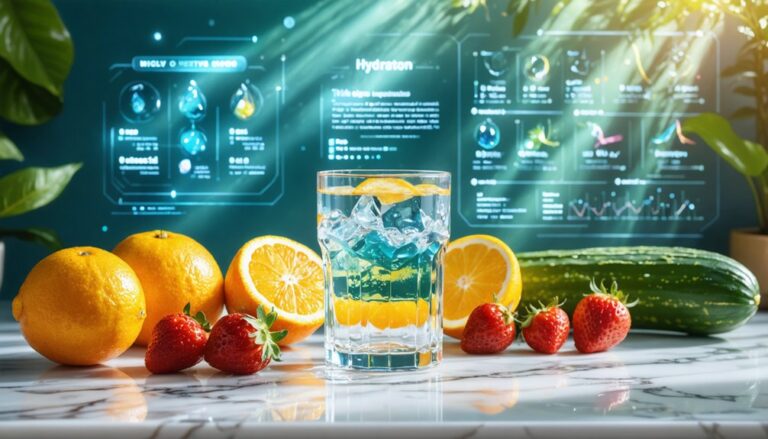Many common hydration myths have been debunked by modern research. The famous “8 glasses a day” guideline is overly simplistic, as hydration needs vary based on several factors, including age, weight, and activity level. Thirst often misrepresents hydration status, prompting inadequate fluid intake. Moreover, caffeinated beverages can contribute positively to hydration. Understanding individual hydration requirements is crucial, alongside recognizing the risks of both under- and overhydration. Exploring these perspectives reveals more about ideal hydration strategies.
Highlights
- The “8 glasses a day” rule lacks scientific evidence; hydration needs vary by individual factors such as body size and activity level.
- Thirst often activates after only 1-2% body water loss, which can impair performance; proactive hydration strategies are essential.
- Moderate caffeine consumption does not negatively impact fluid balance and can be included in hydration plans without concern.
- Overhydration can cause hyponatremia, which can be life-threatening, especially in high-risk populations like endurance athletes.
- About 20% of daily fluid intake comes from food, including high-water content items like fruits and soups.
The “8 Glasses a Day” Rule: A Myth Unveiled
The commonly cited “8 glasses a day” rule has long been ingrained in popular culture as a straightforward guideline for hydration. Originating from a 1940s recommendation of 2.5 liters of daily fluid intake, this simplistic mantra misinterprets the original suggestion that much of this intake comes from food sources.
Scientific reviews have found no empirical evidence supporting the universal need for eight 8-ounce glasses daily. Individual hydration needs vary substantially due to factors like body size, age, and physical activity. Moreover, diverse water sources—ranging from fruits like watermelon to beverages such as tea—contribute substantially to overall hydration. In fact, weather affects hydration needs, with more water required in hot and humid climates. Additionally, studies show that the osmoregulatory system is effective in maintaining water balance without the necessity of strict intake guidelines. It is important to note that the body loses roughly 1.5-2 litres of water every day through various means, necessitating a flexible approach to hydration.
Ultimately, understanding and personalizing hydration strategies based on individual circumstances is crucial for maintaining ideal health. In addition, it is essential to take a plunge into the world of individualized hydration plans. Moreover, it is essential for maintaining overall wellbeing.
Thirst: An Inaccurate Indicator of Hydration
Although many individuals instinctively rely on their thirst to gauge hydration levels, scientific evidence suggests that this approach can be misleading. Studies show that thirst mechanisms often activate only after 1-2% body water loss, a range where physical and cognitive performance can already decline. Athletes frequently under-hydrate, with over 56% missing fluid replacement by 40% or more when depending solely on thirst. Additionally, 18% risk over-hydration, potentially leading to dangerous hyponatremia. Thirst perception can vary based on environmental conditions, further complicating hydration accuracy. To minimize dehydration risks, experts recommend personalized fluid replacement strategies, which incorporate objective assessments beyond mere thirst, ensuring individuals meet their hydration needs effectively during activities. Thirst is evaluated as a marker of hydration status following exercise-induced dehydration. Dehydration impairing performance is a crucial factor to consider, as it affects speed and power output during exercise, regardless of an individual’s thirst level. Maintaining total body water is essential to prevent impairments in cognitive performance and physical capabilities during daily activities.
The Caffeine Conundrum: Hydration or Dehydration?
While caffeine is often blamed for causing dehydration, emerging research reveals a more subtle relationship between caffeinated beverages and hydration status. Studies indicate that moderate caffeine intake of three to five cups daily does not adversely affect fluid balance. For habitual consumers, the diuretic effect is substantially diminished, with no notable changes in urine output or hydration markers observed. Moreover, decaffeinated coffee also contributes positively to hydration. Even in exercise situations, caffeine does not hinder hydration, as any mild diuretic effects are offset by fluid consumption. Consequently, for those enjoying their morning coffee or afternoon tea, current evidence suggests that these beverages can be incorporated into a well-rounded hydration strategy without fear of dehydration. Additionally, current EFSA dietary references values for water intakes support the idea that caffeine consumption does not lead to dehydration when intake is moderate. Notably, regular caffeine consumption leads to a tolerance to its diuretic effects, further supporting its role in hydration.
Overhydration: Understanding Hyponatremia Risks
Overhydration, often overshadowed by concerns about dehydration, presents a significant health risk that can lead to hyponatremia, a condition characterized by dangerously low sodium levels in the bloodstream. This condition occurs when water intake exceeds sodium content, diluting blood sodium and causing cellular swelling, especially in brain tissue. Symptoms can escalate from nausea and confusion to seizures and loss of consciousness. High-risk populations include older adults, endurance athletes, and those with chronic illnesses or certain medications. To guarantee safety, hyponatremia prevention is vital, emphasizing the importance of maintaining a balanced electrolyte intake. A low glomerular filtration rate (GFR) can impair kidney function and exacerbate the risk of hyponatremia. Sodium helps balance fluid in the body and is essential for proper nerve and muscle function, highlighting its critical role in our overall health. Treating associated conditions such as adrenal gland insufficiency can help prevent hyponatremia. Understanding one’s hydration needs and managing fluid consumption can promote a healthier community approach to hydration, ultimately enhancing overall well-being.
Practical Methods to Assess Your Hydration
Effective assessment of hydration status is crucial for maintaining health and performance. Individuals can employ various methods for hydration tracking, including urine specific gravity assessment and urine color evaluation. The refractometry method for specific gravity is preferred due to its small sample size and accuracy. Urine color, evaluated on an 8-point scale, can provide immediate perspectives, with darker shades indicating inadequate hydration. Daily body mass monitoring offers another practical fluid monitoring technique, where fluctuations beyond 2% signal potential dehydration. Combining these assessment methods delivers a thorough view of hydration status, promoting a proactive approach to fluid intake. Emphasizing these simple strategies encourages a sense of community wellness, enabling individuals to take charge of their hydration needs effectively. Moreover, hydration status can influence exercise performance and overall health, making accurate assessments vital for athletes. Research supports the use of urine concentration to maintain normal blood chemistry during exercise, emphasizing the importance of proper hydration strategies. It is essential to note that dehydration risks increase significantly when 2% or more of body mass is lost through fluid losses.
The Truth About Food and Fluid Intake
Understanding the intricate relationship between food and fluid intake is essential for comprehending overall hydration. Approximately 20% of total fluid intake stems from food, emphasizing the importance of maintaining a diet rich in high-water content items like fruits, soups, and yogurt. This water content substantially supports fluid balance and hydration status. Additionally, consuming beverages alongside meals enhances fluid retention, while very high water intake without food can lead to increased urinary elimination. Cultural and age-related differences in water consumption patterns must be acknowledged, as they impact overall hydration. Ultimately, combining adequate fluid intake from both beverages and nutrient-rich foods is key to achieving sustained hydration and healthful living. Furthermore, adequate hydration is crucial for regulating bodily functions, including thermoregulation and cognitive performance. Notably, concentrated urine is often indicative of low water consumption, reinforcing the necessity to balance food and fluid intake for optimal hydration. It’s important to note that meeting daily fluid intake recommendations is associated with positive outcomes related to renal, cardiovascular, and metabolic health.
Individual Hydration Needs: One Size Does Not Fit All
Hydration needs vary substantially among individuals, influenced by a range of factors including age, health status, activity level, and environmental conditions. For example, fluid intake requirements can differ greatly; while young children may need around 1300 ml per day, adult males could require up to 3700 ml. Additionally, those facing health issues such as fever or chronic conditions may need extra hydration to maintain ideal hydration levels. Environmental factors also play a role; hot climates or vigorous exercise demand increased fluid consumption. Particularly, behavioral aspects, like fruit and vegetable intake, can affect hydration. Health education can significantly enhance awareness about these variations, highlighting the importance of personalized approaches to fluid intake, moving beyond generic advice to better meet individual hydration needs. Importantly, the National Academy of Medicine suggests that adequate fluid intake is indicated by rarely feeling thirsty and having colorless or light yellow urine.
Physiological Water Loss: What You Need to Know
Water loss is a natural and essential physiological process that occurs continuously in the human body through various pathways. Adults lose approximately 2.5 liters of water daily via skin, respiration, urine, and minimal gastrointestinal routes.
This loss directly impacts water balance and fluid regulation, as dehydration can occur if water is not replaced. The body employs compensatory mechanisms, including the release of antidiuretic hormone (ADH) and activation of the renin-angiotensin-aldosterone system, to respond to changes in osmotic pressure. Even a mere 1% change in body water can trigger physiological thirst and prompt fluid intake. Awareness of these processes promotes a deeper understanding of hydration needs and the importance of maintaining fluid levels for ideal health.
Modern Science and Personalized Hydration Recommendations
Personalized hydration recommendations have emerged as a significant advancement in optimizing fluid intake for individual needs.
Utilizing advanced analytics and genetic profiling, these strategies take into account unique physiological traits, such as sweat rate and sodium concentration.
Through techniques like absorbent patch analysis, assessments enable individuals to accurately gauge fluid replacement requirements during exercise.
Algorithms formulate recommendations based on anthropometric data, offering fluid intake ranges that accommodate daily variations.
Research indicates that personalized hydration enhances performance in various environments, particularly during high-intensity workouts.
Wearable technology aids in real-time monitoring and tailoring hydration strategies, ensuring individuals maintain ideal fluid balance.
References
- https://www.urmc.rochester.edu/news/publications/health-matters/hydration-101-drinking-8-glasses-of-water-and-other-myths-debunked
- https://www.healthynursehealthynation.org/our-resources/blogs/2022/debunking-4-common-hydration-myths/
- https://pmc.ncbi.nlm.nih.gov/articles/PMC2908954/
- https://www.ncoa.org/article/the-truth-about-hydration-7-myths-and-facts/
- https://www.uhhospitals.org/blog/articles/2023/11/how-much-water-do-you-really-need
- https://www.equinox.com/articles/2013/02/hydration-myths
- https://www.mcgill.ca/oss/article/health-nutrition/water-myth
- https://pubmed.ncbi.nlm.nih.gov/12376390/
- https://www.healthline.com/nutrition/8-glasses-of-water-per-day
- https://www.tuftsmedicine.org/about-us/news/medical-myths-drink-8-glasses-water-each-day



